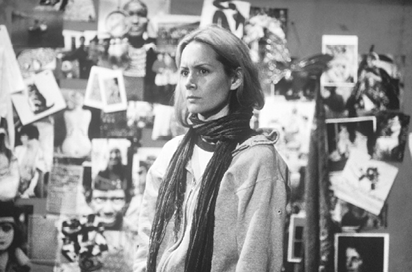After the war, controversial play lands in New York
When 23-year old American activist Rachel Corrie was crushed by an Israeli bulldozer in 2003 while trying to save Palestinian houses in the Gaza Strip, she was instantly converted into a symbol.
Palestinians hailed Rachel as a martyr, while Israelis vilified her as a starry-eyed blonde who stuck her inflated ideals where they didn’t belong. Some Americans branded her a traitor. Although eyewitnesses claimed it was out-and-out murder, no formal investigation was ever initiated, and many were outraged.
But it wasn’t until Katharine Viner and director Alan Rickman created a play about the incident and attempted to stage it in New York last spring that things really got ugly.
The play, “My Name is Rachel Corrie,” a considerable hit in London, was yanked from the schedule of the New York Theater Workshop six weeks before opening night, around the time of Ariel Sharon’s illness and the election of Hamas. The show’s creators, along with luminaries such as Vanessa Redgrave, Tony Kushner, and Harold Pinter, cried censorship. A pointed letter denouncing the decision was published in The New York Times. The stinging irony of a play about social injustice being blocked by a not-for-profit, supposedly freethinking artistic outlet was lost on no one.
Now, the polarizing work has finally found a home Off Broadway at the Minetta Lane Theatre, where there are no subscribers to piss off. Frankly, I’m not sure what all the hullabaloo was about.
“My Name is Rachel Corrie” is a modest, intimate solo show dramatizing the beautiful activist’s all-too-brief life that, when viewed with a clear head, refuses to take sides. Instead, it paints a tender, haunting portrait of the pacifist soul behind the icon, comprised entirely of her own words from copious journals and e-mails to her parents, written both at home in Olympia, Washington and in the Middle East.
Although the play is indeed politically charged, no playwright is pushing an agenda, here. Viner and Rickman simply shaped Rachel’s best writings from a pile of material provided by the Corrie family. Sure, Rachel is sympathetic to the plight of the Palestinian civilians, and yes, she makes a few cracks about the evils of U.S. foreign policy, but her motivations are portrayed more as humanitarian than political.
Rachel’s only true enemy is complacency. She’s got a fire in her belly, and she’s fed up with materialistic America, where “The highest level of humanity is expressed through what we choose to buy at the mall.” This hyper-aware neo-hippie became an idealist and activist at age 10, when she led a pint-sized crusade to fight world hunger.
The play is also about the will to act, to effect positive change, as evidenced by Rachel’s obsession with to-do lists. (Apparently, when the going gets tough, the tough make lists.) Not exactly the most dramatic material, to be sure.
Rachel’s rebellious spirit is reflected in her hometown bedroom, which is festooned with dirty clothes and a wild spray of photos and post cards tacked collage-style on a blood-red wall. Her passion for life—and justice—is palpable. The living space, which takes up roughly one-third of the stage, is a riot of creative energy in contrast to the somber, concrete walls of Gaza, crumbling and riddled with bullet holes. Hildegard Bechtler designed the set and costumes.
This production would amount to little more than a mound of rubble were it not for the pertly radiant performance of Megan Dodds, who originated the role at the Royal Court Theatre and the West End, for which she won the 2006 London Theatregoers’ Choice Award for Best Actress. Throughout the 90-minute monologue, the dynamo rarely misses a beat, even when she darts offstage for a quickie costume or set change. Think Anne Heche with her meds titrated just right.
Steeped in poetic imagery, the text also uncovers moments of biting prescience. Early on, well before her death, Rachel describes the overwhelming sensation that the ceiling has grabbed her and is “going to rip me to pieces.” Later, she recounts—“Had a dream about falling, falling to my death off something dusty and smooth and crumbling like the cliffs in Utah…”
Besides being a character study, the work aims to rattle us out of our self-satisfied stupor, and incite us to take action against senseless human suffering—or at least to stir a pang of guilt. Given the recent escalation of violence in Gaza, where blood is shed almost daily, the work is more poignant than ever.
Many have criticized “My Name is Rachel Corrie” for its singular voice, neglecting opinions from other sides. Yet, as Viner has suggested in interviews, perhaps detractors are confusing theater with journalism. This is not a balanced news analysis—it is art.
Was Rachel a hero or a greenhorn? A subversive or a saint? A fighter or a fool? Surely, as this uncanny, touching piece of theater suggests, she was all these things, more or less.
gaycitynews.com


































